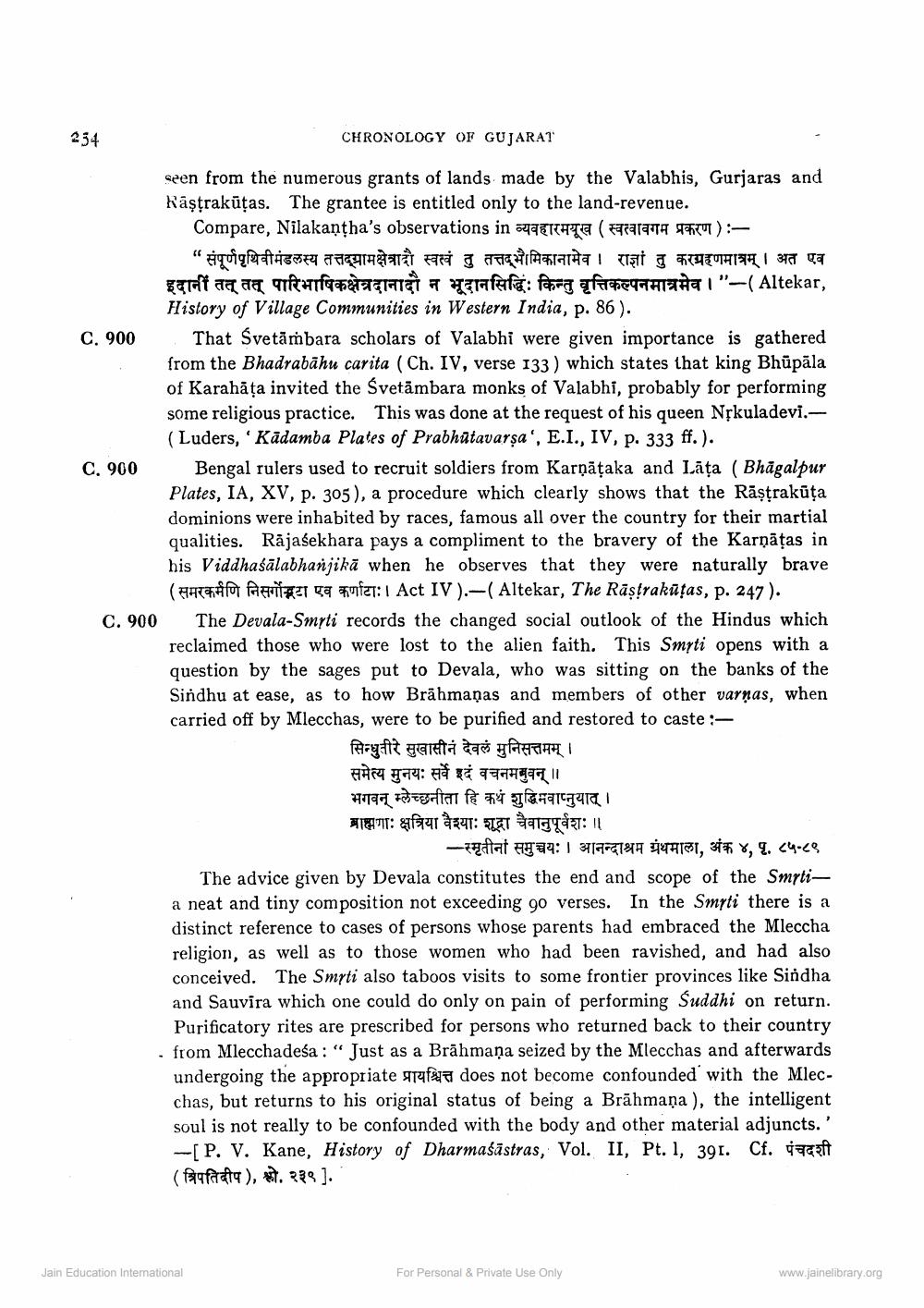________________
234
CHRONOLOGY OF GUJARAT
seen from the numerous grants of lands made by the Valabhis, Gurjaras and Râştrakūtas. The grantee is entitled only to the land-revenue.
Compare, Nilakantha's observations in 49 HTC (Fararam4 472) :
" संपूर्णपृथिवीमंडलस्य तत्तद्ग्रामक्षेत्रादौ स्वत्वं तु तत्तभौमिकानामेव । राज्ञां तु करग्रहणमात्रम् । अत एव grat ac aa 9 TOFTHOI T rafale: fara a fare HTĀTI "-( Altekar,
History of Village Communities in Western India, p. 86). C. 900 That Svetāṁbara scholars of Valabhi were given importance is gathered
from the Bhadrabāhu carita (Ch. IV, verse 133 ) which states that king Bhūpāla of Karahăța invited the Svetämbara monks of Valabhi, probably for performing some religious practice. This was done at the request of his queen Nộkuladevi.
( Luders, Kādamba Plates of Prabhūtavarşa', E.I., IV, p. 333 ff.). C. 900 Bengal rulers used to recruit soldiers from Karņāțaka and Lāța (Bhagalpur
Plates, IA, XV, p. 305), a procedure which clearly shows that the Rāştrakūta dominions were inhabited by races, famous all over the country for their martial qualities. Rājasekhara pays a compliment to the bravery of the Karņāțas in his Viddhaśālabhanjikā when he observes that they were naturally brave
( for Papier a ufzt: 1 Act IV):-( Altekar, The Răstrakūtas, p. 247). C. 900 The Devala-Smrti records the changed social outlook of the Hindus which
reclaimed those who were lost to the alien faith. This Smyti opens with a question by the sages put to Devala, who was sitting on the banks of the Sindhu at ease, as to how Brāhmaṇas and members of other varņas, when carried off by Mlecchas, were to be purified and restored to caste :
सिन्धुतीरे सुखासीनं देवलं मुनिसत्तमम् । समेत्य मुनयः सर्वे इदं वचनमबुवन् ।। भगवन् म्लेच्छनीता हि कथं शुद्धिमवाप्नुयात् । ब्राह्मणाः क्षत्रिया वैश्याः शूद्रा चैवानुपूर्वशः ।।
-utat ataq: 31196791H DYATI, 3** , 4. <4.69 The advice given by Devala constitutes the end and scope of the Smrtia neat and tiny composition not exceeding 90 verses. In the Smyti there is a distinct reference to cases of persons whose parents had embraced the Mleccha religion, as well as to those women who had been ravished, and had also conceived. The Smrti also taboos visits to some frontier provinces like Sindha and Sauvira which one could do only on pain of performing suddhi on return. Purificatory rites are prescribed for persons who returned back to their country from Mlecchadeśa : “ Just as a Brāhmaṇa seized by the Mlecchas and afterwards undergoing the appropriate atafaga does not become confounded with the Mlecchas, but returns to his original status of being a Brāhmaṇa), the intelligent soul is not really to be confounded with the body and other material adjuncts.' --[P. V. Kane, History of Dharmaśāstras, Vol. II, Pt. 1, 391. Cf. 1783 (fagfarata), 389].
Jain Education Intemational
For Personal & Private Use Only
www.jainelibrary.org




